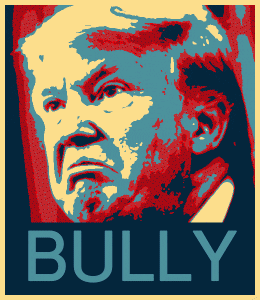 I think we can all agree that Donald Trump is a bully. I even think that his staunchest supporters like him because he is a bully—he says and does things they would like to do themselves. “Speaking his mind” and “not being politically correct” are euphemisms for behavior that in most contexts would be considered bullying.
I think we can all agree that Donald Trump is a bully. I even think that his staunchest supporters like him because he is a bully—he says and does things they would like to do themselves. “Speaking his mind” and “not being politically correct” are euphemisms for behavior that in most contexts would be considered bullying.
While there have been some signs in the last week or so that Trump has finally crossed too many lines, pundits have been saying this about him from the very beginning so it’s difficult to predict how this story is going to end. Yet whatever the ultimate outcome is, there is no question that his presidential campaign has shaped this election in significant ways. Win or lose, the damage is already done.
As youth workers, we must ask ourselves how these many months of Trump dominating the political process has and will affect the youth of our nation. A bully has been chosen by millions of Americans to be the next President of the United States. His rallies have celebrated and validated his bullying behavior. We have seen several instances of his heated rhetoric being amplified into very real violence. He has dragged other candidates into the muck as they tried to match his bullying with more bullying. And while it is right to wonder how this campaign is damaging our reputation around the world, it is perhaps more important to consider how it is shaping emerging generations here at home.
Joe Feldman, the parent of two young people I worked with in Chicago, is asking this very question. Like many of us, he has been deeply distressed by the tone and content of this presidential election and is very concerned about the impact it is having on our young people. As he prepares to do something about it in his community, he’s put together a survey to collect the perspectives and experiences of others who are concerned by this phenomenon. “What are the broader implications of such high-profile bullying on adults, teens, and younger children?” he asks. I encourage you to add your voice to his project by completing his short survey.
One of his early responses highlights the importance of Joe’s questions:
As a K-8 Counselor we have already had several incidences of students repeating what they’ve heard on the news to other students who are minority. The parents argue that if it is said during the Presidential election the students should not be punished.
For a variety of good reasons youth workers are sometimes hesitant to engage political issues or stories with their youth. But the gospel of Jesus is thoroughly political, and whether we admit it or not, what we believe influences our political philosophies and decisions. So I hope that you are talking about this presidential campaign with your youth. (Of course, you can talk about Trump’s tactics without judging his politics—he could certainly advocate for his policies without resorting to bullying.)
Beyond such discussions, we must also work harder than ever to have zero tolerance for bullying and microaggression in our youth groups. This was something I had to come to grips with myself because friendly teasing is a natural way I relate with others. Even before I arrived, the first youth group I worked with jokingly called themselves “the meanest youth group in America” because this kind of teasing and pranking was so much a part of the youth ministry culture. But I eventually began to realize that not everyone thought it was so funny and that we were creating an environment in which subtle bullying was not only tolerated but encouraged. Without intending to do so, I allowed myself to give in to bullying tendencies. This wasn’t easy for me to admit to myself, but it was a critical step in my development as a youth worker.
It’s easy to rationalize this behavior as playful, fun, and harmless. It’s easy to say that it’s kids being kids and adults joining in. But left unchecked, these subtle microagressions can grow into something like the persona Donald Trump has cultivated in the business, entertainment, and now political arenas. It was easier to ignore when he was playing the part of a business tycoon and reality TV personality. But the danger of his political campaign is that in the eyes of some it is granting legitimacy to bullying behavior.
There is nothing about the way of Jesus that even remotely resembles bullying. We must make sure our youth ministries reflect this. And we must work beyond the walls of our churches to counter the culture of bullying that is working its way through our society like a disease.
















